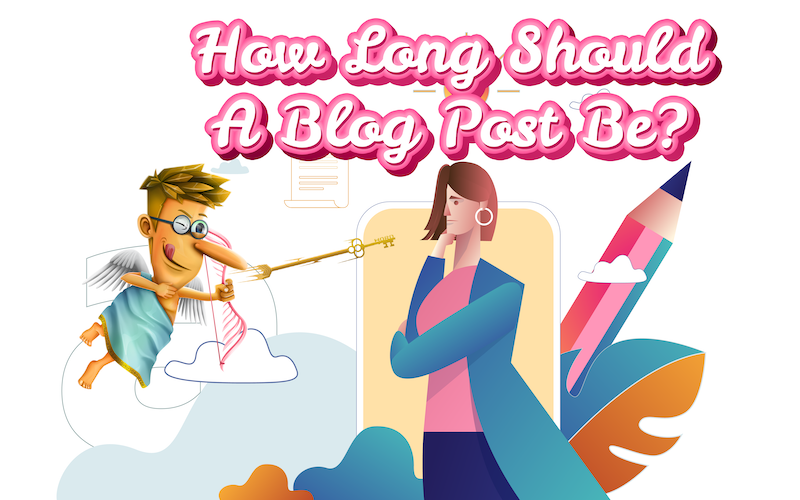Table Of Contents:
Hi Internet Marketing Friends – I’m Corey Rose.
I’ve been in Internet marketing for 15 years and run the Search Geeks out of San Diego, CA. I’m a regular presenter at live events by NFG SEO including a weekly podcast; event speaker at SEO Rockstars, Cashflow Digital with Craig Campbell, Courses with Jimmy Kelly, and sit on the board with several Internet marketing agencies.
I’ve worked on over 1,000 client websites and used every tool in the shed to ensure maximum exposure and explosive growth for those websites. Today I’m going to detail for you how I’ve used Google Ads (PPC) to rank websites organically.
“BS!” You might say – and I get it! The first thing we should consider is exactly what Google says about this:

OK, we should just trust Google and move on, right?
WELL, if we’re going to consider it in terms of a binary relation then what Google says here is … true. There is no mathematical function in the relationship between PPC and SEO. BUT… I’m going fact check and debunk Google’s denial of “myths and claims” before your eyes 😃
The year was 2000. Just a few years after the launch of public Internet access, there were tons of entrepreneurs who knew that the Internet was an absolute game changer.
The best I could find at the time was placing “FFA” (free for all) ads online, teaching others how to make money online.
IT WAS AN AFFILIATE COURSE on how to make money online… and the best way to make money online was SELLING THE COURSE on how to make money online 🤷♂️.
FF to 2006→
I had gone through college in an unrelated industry – but all the while was doing graphic and web design for individuals who had businesses that needed an Internet presence. It wasn’t until they started asking me “…the website looks great, but how do we get customers to see it?...”
Google’s answer was PPC (pay per click). And the Internet community’s answer was … “SEO” (before it was called SE0) – that is, rank in the organic section of the SERPs.
For those of us looking for a quick way to get in front of that target audience, however, this was solid gold. And solid gold for Google (how do you think they make $80b+ / year?)
Buy a billboard and get in front of 100,000 people / month who may or may not be interested in your product/service.
But get in front of the 1,000 people / month while they’re in the “heat of the search” – never before had anyone offered such an absolute thrasher. And you’re in the money.
I’ll preface this post by saying that I’m not going to lay out the best practices for building an ads campaign that generates sales – that’s a different post.
SEO & PPC: The Symbiotic Relationship
There are many examples in nature that demonstrate symbiosis between two unlikely bodies in the universe. For example – the sea anemone and the clown fish:
The poison released by the tentacles that surround the mouth of the anemone stun all the other fish in the sea so the fish can be easily eaten by the anemone. However, the clown fish is immune to the poison, which lets it find refuge from predators, buried in the anemone’s tentacles. The clownfish’s presence lures other fish into the trap-refuge then the anemone easily stuns those fish and has food for the day. It’s a win-win, and an unlikely symbiosis.
Here’s another fun example – the Oxpecker (not making this up) and grazing animals:

The oxpecker (the bird on the buffalo’s nose) eats dead skin and scar tissue off of grazing animals. They are also keenly aware of their surroundings and will hiss if a predator is near, alerting its host to GTFO of there.
Back to Google.
Inbound Links
In the SEO world, everyone understands the value of good inbound links from sites that have Traffic, Trust and the right Theme. The right link provides validation of your content and contributes to your website’s trust rank and page rank. It’s quality over quantity. And together with a solid content strategy, links will fast track a website into high rankings.User Profile
Suppose you get a random visitor to your website that Google knows nothing about. This might be a bot, a newbie to the internet, someone incognito on a public machine at the library… There’s no profile around this visitor so Google has no chance to personalize search results based on the history of the visitor.BUT, let’s assume this once newbie to the internet has been using Google for years, and suppose over time, they have collected data:
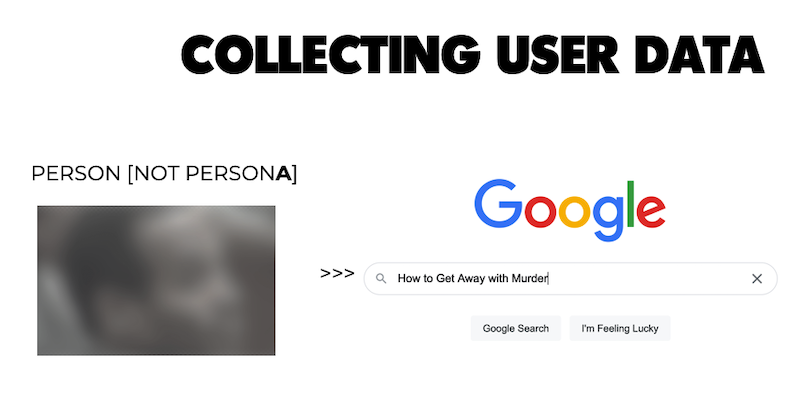
As this individual racks up related queries and Google is tightening up the auto-suggest for this person, the picture becomes clearer:
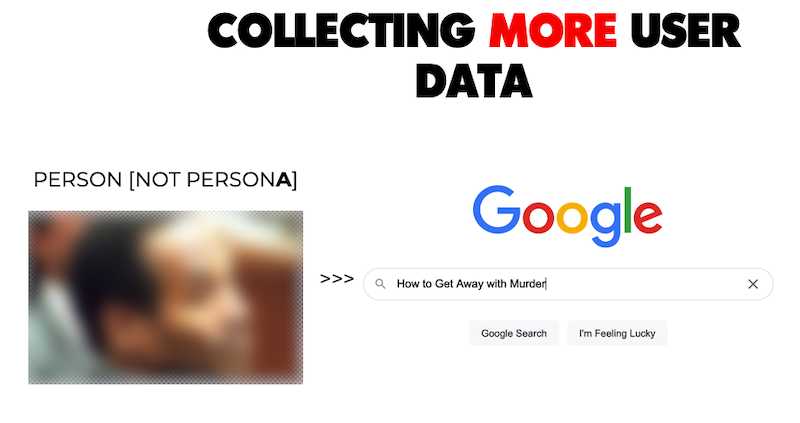

A picture starts to emerge of a persona and a person, tracked with a unique user ID. This user ID is stored in several databases across the internet from Google’s own database to ad networks. Here’s a Google patent diagram that shows how this information is stored and processed:

Anyone familiar with Google’s ad platform and who has seen how granular the targeting can be will quickly understand how much information Google knows about individuals.
SEO Currency = content, links and TRAFFIC
Traffic from user IDs that Google has extensive knowledge of has the potential to push SEO like content and links. Major considerations of the persona that visits a website:
- Browsing history
- Referring site
- Query associated
- Shopping history
- Location history
- Age
- Gender
- Income
- Education
- More …
Follow this logic.
Buying ads is similar to links because it sends a powerful signal. Instead of getting links from seed sites – that is, sites that are considered authority sites within the corpus of your main market, seed visitors have the potential to bring your website into the body of Google’s primary index – and depending on how that audience responds to your website, into high-ranking positions. Why? … and How?
Here’s what most people think happens when running ads on Google:
Visitor Goes to Google >>> Types in a Query >>> Finds your Ad, then ends up on your website:
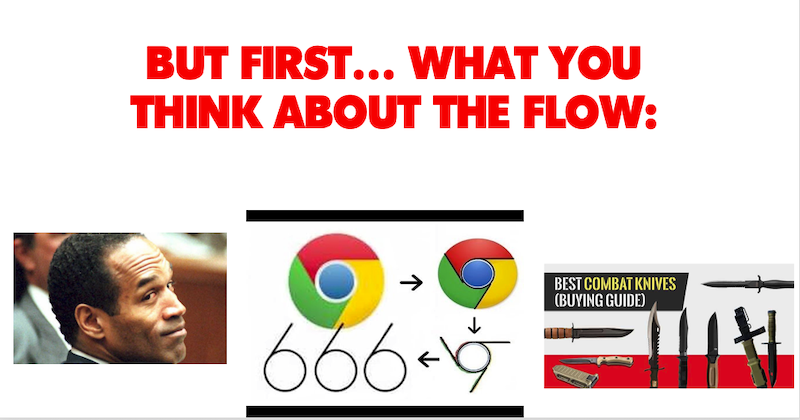
Supposing that’s all that happens when you buy traffic from Google, Google is right – PPC doesn’t affect SEO and my entire thesis garbage.
Let’s consider what Google already knows about this visitor’s history:
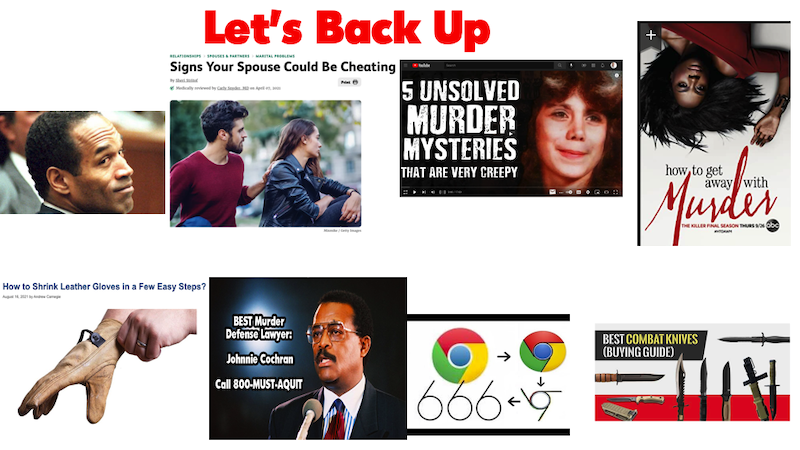
We have here a complete profile of someone whose browsing history is now reasonably within the persona of someone who would purchase from your website. There is now a correlation between your website’s visitors and the content / product / service and other competitors based on the lightning fast feedback loop you just closed by having that persona visit your website.
NOW, Let’s Consider the Other Side of Advertising on Google = what Google Now Knows about You the Advertiser
As of late 2020, Google now requires ID of advertisers – a driver’s license / passport. They also now have real money behind the website in the form of a credit card paying Google for those ads. You’ve just proven to Google that you’re a real business owner with a real business website. This association with your business website is now supplemented with YOUR:
- Identity
- Analytics
- Activity – search history, location, purchase history etc…
- Alternative content – Gmail (yes they read your email including sales, responses to customers etc), Google docs / Drive etc…
- Micro conversions and conversions
Let’s sum it up
Google knows who you are
A legit business owner with a real business website. They know:- where you live
- what your credit card number is
- what you’ve purchased online
- what websites you’ve visited
- who you’re in touch with and what you write in emails
- the content you’ve put out across Google properties
- where you’ve been
Google sees who has visited your website
Someone who:- went to Google to find answers at the top of the funnel
- continued their research and maybe even purchased something related
- searched for more information and visited seed sites, commented in forums
- Google knows their entire internet history even if not through search
- Is a persona who matches the kind of persona in the market that Google wants to please (their results are why people keep coming back)

You have provided Google with all the data needed to pass along the trust needed in order for your website to not only get into the primary index, but to start ranking in the top positions in Google, based on the above data you’ve just fed them.
PROVE IT!
You say… And I shall!Here are some real examples of many where after the initial on-page optimization was complete, we did nothing more than send paid traffic from Google to these sites, and here are the results:
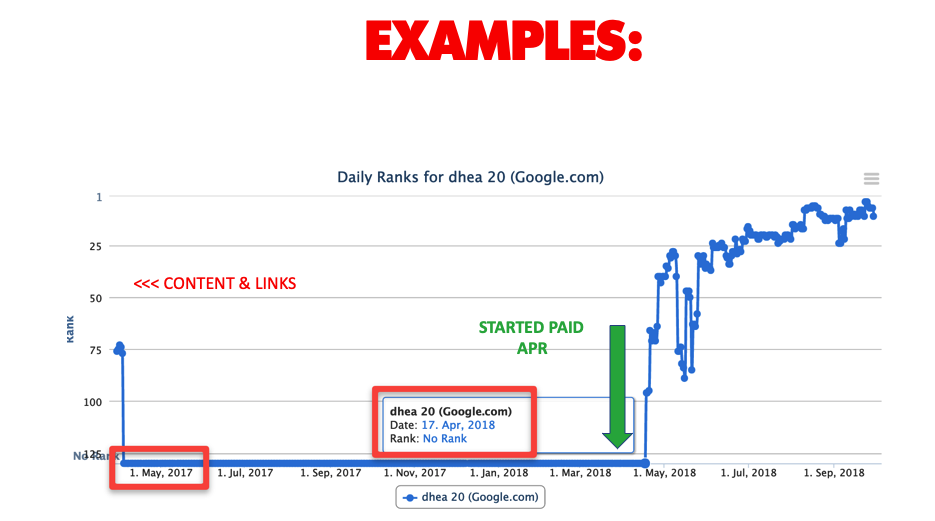
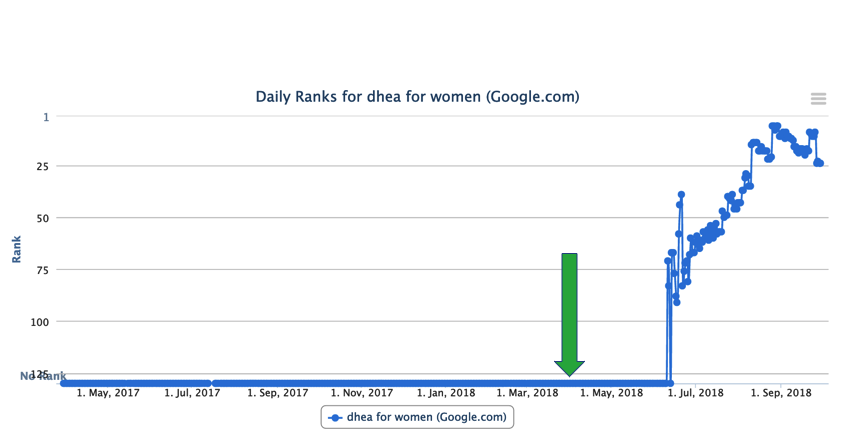
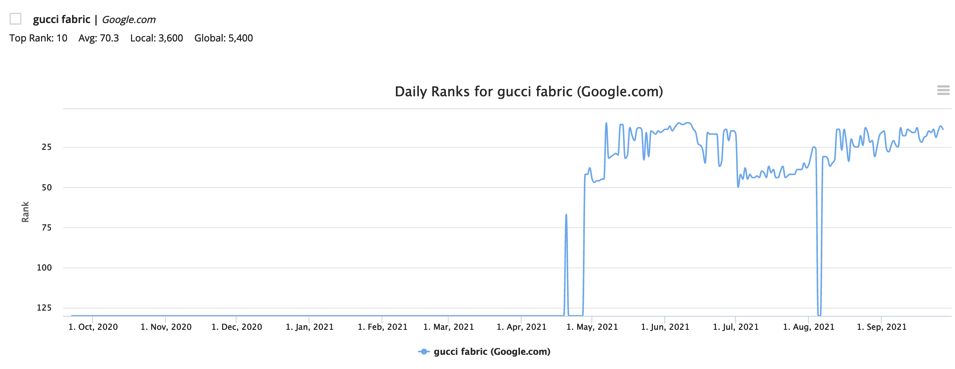

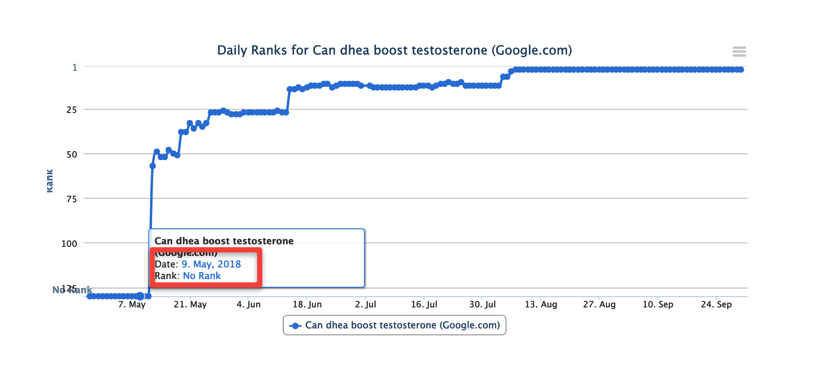


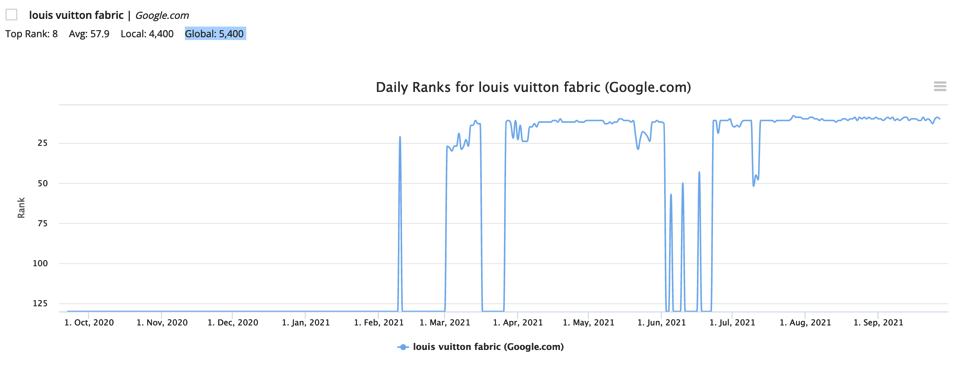
How much money did I spend on these campaigns?
It wasn’t much before we started getting some sales. I’ve done it with as little as $20 worth of traffic where clicks are under $1. But in general, I’ll put $300 ($10/day for a month) towards a campaign like this. And mix it up to get a variety of visitors / queries.What kind of keywords are you targeting?
This is always the right question – and for purposes described in this blog, they’re pretty similar to the kinds of keywords that we’ll use for our money terms. Plus we’re collecting data that you can’t get any other way than to pay Google for them.How do we perform the research?
Without a doubt, my new go-to is Keyword Cupid. I’ve used this data for SEO, and it’s great. But I started rolling out not only the kind of campaign detailed in this post but actual eCom campaigns (which I’ll get into in another post).Simply put, here’s the keyword research strategy:
- Google the main query you’d like to rank for
- Grab the top 3 ranking competitor URLs (not Amazon, Yelp or directory sites, but real competitors)
- Drop those URLs into Semrush and pull the list of the keywords they each rank for in the top 20
- Combine them into the same spreadsheet and remove duplicates
- Import into Keyword Cupid with the BYOD (don’t need to SERP Spy)
- You now have both your Campaign name and your SKAG groups (single keyword ad groups) laid out perfectly, in a scientifically controllable environment.
If you know Google ads, then you’ll have your Analytics tied in, conversion tracking setup, Gmail for business and you’ll be using the Google Ads Editor along with some slick templates so you don’t have to build it all by hand (again, this will be in another post).
But armed with this information, you now have the blueprint to start rapidly testing for yourself. I’d love to hear your questions, comments and stories about how you’ve used this symbiotic relationship with Google PPC to enhance your SEO efforts.
Stay fruitful my friends 🔥
Corey D. Rose
https://www.instagram.com/coreydrose/



